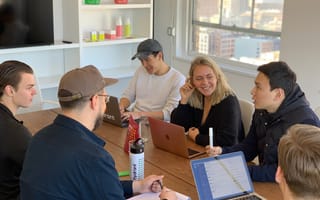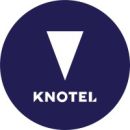
Pop culture might romanticize the journey from dorm room-conceived startup to Silicon Valley’s next big thing, but no retelling can ignore the obvious: the quest for growth is long, tough and filled with hiccups at nearly every turn.
And despite what any best-selling book or star-studded talk might suggest, there is no foolproof formula for transitioning from a scrappy startup to a growth company.
Accepting that fact, said Jai Jung Kim, co-founder of hydration mix product Hydrant, has been integral to the company’s success.
“There is no silver bullet to growing a business,” he said.
Nevertheless, based on the growth stories from the following NYC tech companies, there are a few essentials to adhere to, including empathetic leadership, collaboration and accountability in the face of adversity.
Constructive feedback is valuable in the workplace, but Soffen believes “positive feedback” is even better. Accordingly, the vice president of healthtech platform Quartet Health doles it out in a “6:1 ratio” so as to keep the wins top of mind even when the going gets tough.
What were some of the key contributors to your success as you grew your company from a startup to a growth-stage business?
Quartet’s success is a function of its mission and people. Our mission is the north star that drives our strategic direction and decision-making. Our mission also attracts a diverse set of talented individuals across engineering, data science, product and many other disciplines who want to work in an environment that empowers them to solve some of society’s biggest challenges.
What were some of the most significant milestones along the way?
Because of our mission and people, we have achieved some amazing milestones. I will always remember our first office, first user, first offsite and, of course, our first contract with a health insurance plan. Other meaningful moments include becoming a Modern Healthcare “best” place to work, flying in more than 250 employees to our NYC location this past fall, launching a value-based mental healthcare initiative with Blue Cross and Blue Shield of North Carolina and expanding our capabilities into Medicaid to serve the underserved.
When mistakes are made, avoid finger-pointing and focus on learning.”
What were the most important lessons you learned in that period?
I have learned many valuable lessons. Three stand out.
First, lead with empathy. What Quartet is aiming to accomplish is hard. One way we are able to be successful is by assuming positive intent with each other as things move fast and get messy. When we remember that we are all here to achieve a common mission, we are able to overcome hurdles together as one collaborative team.
Second, provide and reinforce clarity at every turn. Scaling a growth company is hard, let alone in a complex industry like healthcare. When you are small, everyone wears many hats and pitches in to do whatever is needed. As you scale, clearly defining areas of accountability gives people more ownership and more freedom to exercise creativity without stepping on each other.
Positive feedback is just as important as constructive feedback. In fact, I’ve learned it is more important. Therefore, I give feedback in a 6:1 ratio — six pieces of positive feedback for every constructive piece of feedback. That doesn’t mean constructive feedback gets buried, but in a startup, where everyone is moving fast and working hard, it is important to call out and celebrate success more than the inevitable mistakes. And, when mistakes are made, avoid finger-pointing and focus on learning. Scaling a company necessitates a lot of mistakes, but the best way to learn and grow is to simultaneously understand the successes.
For the Tribeca-based team at Hydrant, growth has gone hand in hand with learning the importance of teamwork, embracing the expertise of advisors when necessary and paying individualized attention to the unique needs of the business, Kim said.
What were some of the key contributors to your success as you grew your company from a startup to a growth-stage business?
There have been two core contributors to our success. First, the belief that there is no set playbook, and we have to find what works best for ourselves. There is no silver bullet to growing a business. The second is spending time actively thinking about what we don’t know and then finding the right group of advisors to help guide us in these areas where we don’t feel as strong.
What were some of the most significant milestones along the way?
A significant milestone that came from these contributors was demonstrating proof of concept at Whole Foods Market, showing that our product can move off the shelf quickly, and that our team can be effective at retail.
There is no silver bullet to growing a business.”
What were the most important lessons you learned in that period?
You can’t accomplish great work alone. Also, “experts” usually come with answers that are highly driven by biases. You need to deconstruct the assumptions in order to find the right answer for your own business. Finally, think in cash flow, not in revenue. This leads to a much healthier business with a longer-term outlook.
The FiDi-based data intel company counts more than $200 million in funding, but success wasn’t always surefire for the company. “Data wasn’t trendy when we first started,” said Van de Maele. He credits Collibra's customer-first mentality for helping galvanize the company’s growth, which included a stateside expansion from Belgium.
What were some of the key contributors to your success as you grew your company from a startup to a growth-stage business?
The one constant that has helped us grow is our customer-first focus. We started Collibra in Belgium, but then expanded to the U.S. to follow our customers. Early on, we heard that data wasn’t just an IT problem, but a business problem that needed a data strategy to match. To this day, what sets us apart is that we’ve built solutions with the business user in mind. By listening to our customers, understanding the problems they need to solve and adapting to their needs, we have grown into a market leader.
Prioritize hiring an executive team that aligns with your values.”
What were the most important lessons you learned in that period?
Be flexible. We started Collibra with a focus on semantic technology, pivoted to data governance and then expanded to become a data intelligence company. Adapting to the needs of the market helped us grow.
Also, be persistent. Data wasn’t trendy when we first started and we had to make our case. Now, people understand the impact of data. The challenge is figuring out how to maximize the value.
Lastly, find the right people. When we transitioned from a founder-led company to an executive-led company, it was a critical shift. Prioritize hiring an executive team that aligns with your values.
For Rosen, keeping Even Financial’s mission close to the vest — as well as building the team around passionate, talented individuals — has been critical in steering the fintech startup’s growth.
What were some of the key contributors to your success as you grew your company from a startup to a growth-stage business?
Clarity on what our mission was from day one: to provide a leading search, comparison and recommendation engine for financial services, and hiring a lot of great, technical and highly capable people that can help accomplish that mission. I’m proud of our continuous success in hiring some of the most motivated and skilled people in the finance and tech industry, and the camaraderie and culture that grew alongside our company.
What were some of the most significant milestones along the way?
Launching our first loan search was a significant milestone for us, as it was a huge step toward that day-one mission. As we continued to expand to support more financial services offerings and great channel partnerships, it further confirmed the feeling that we’ve built an incredible product and team that makes all of this possible.
It was important to always stay focused on providing consumers the best possible user experience.”
What were the most important lessons you learned in that period?
Building an organization from the ground up continuously teaches myself and my team a wide set of lessons on an everyday basis. Our approach to blending finance and technology is gaining market traction and financial institution acceptance. Many have become our investors, such as Goldman Sachs and American Express.
We found that it was important to always stay focused on providing consumers the best possible user experience, matching them with the financial products that best meet their needs through the true search, comparison and recommendation experience we enable in the ecosystem, all while building great partnerships and a fantastic team of people along the way.
According to Sarva, Knotel's reach is 5 million square feet strong. Critical to the real estate startup's growth? Tapping the perspectives of both industry insiders and outsiders alike. “Bringing in employees with both real estate experience and non-real estate backgrounds has been invaluable to us,” said Sarva.
What were some of the key contributors to your success as you grew your company from a startup to a growth-stage business?
One of the key contributors to our success was ensuring all of our employees were empowered by our mission to help build better, more flexible workspaces in the age of disrupting antiquated industries. Wherever there is an office, Knotel can do it better, faster, tailored to each individual company's brand identity and with far less capital expenditure. We do this through regularly scheduled global all-hands meetings and lunch-and-learns, where our different departments can come together to align on company OKRs, share major updates and more.
I also believe our employees can work from wherever they do their best work, so we’ve followed a flexible work-from-home schedule and unlimited PTO policy; I haven’t seen any down sides. Each one of our employees plays an important and unique role as we continue to scale, whether it’s our workspace managers, workplace strategists, environmental brand managers, people operations or the real estate team. I’m excited to see what lies ahead.
Each one of our employees plays an important and unique role as we continue to scale.”
What were some of the most significant milestones along the way?
Since Knotel was founded in 2016, we have grown from two people to hundreds of employees around the world. A major milestone we recently celebrated was hitting 5 million square feet across our global portfolio, with a team of more than 400 strong in major cities from New York, San Francisco, and Washington D.C. to London, Berlin, Amsterdam, Paris, Tokyo and Rio de Janeiro.
What were the most important lessons you learned in that period?
Managing team communication across time zones is key. Bringing in employees with both real estate experience and non-real estate backgrounds has been invaluable to us. Because I’ve trusted our experts on the ground to help fearlessly lead the charge, Knotel has a strong global network of customers, brokers and owners who have all been integral partners to us as we continue to scale.
At Share Local Media, Prabhakar values the power of passion, humility and kindness as the ad tech firm evolves. The CEO said these traits are critical as he navigates a tightrope walk between managing growth and risk.
What were some of the key contributors to your success as you grew your company from a startup to a growth-stage business?
Before starting SLM, I thought back to some of my career experiences. What were the most fulfilling experiences, and how had leaders and companies created the environments for those?
This led to us focusing very deliberately on people and culture at SLM. Team members share three values: passion, humility and kindness. Those three traits are core to who we are. They enable us to feel an incredible sense of camaraderie and teamwork every day. It shows in our work, and it powers our growth.
Plan along two tracks: growth and downside risk.”
What were some of the most significant milestones along the way?
The launch of our technology platform, Poplar, in 2019 was a major milestone for us. We believe product and technology can enhance client outcomes, and the platform allows us to prove that to clients through a whole host of new capabilities.
What were the most important lessons you learned in that period?
My experiences in a number of prior roles have taught me to continually plan along two tracks: growth and downside risk. Planning for growth is fun: at SLM, we employ a team-driven process to continuously invest in and improve upon existing product lines, as well as explore and launch new areas of engagement. Planning for downside risk is equally important, but not so fun: it involves envisioning how business conditions — for example, macroeconomic conditions — might change, and how changes might affect clients and our products and services. Appropriately planning on both tracks at any given time has allowed us to grow sustainably and with peace of mind.










